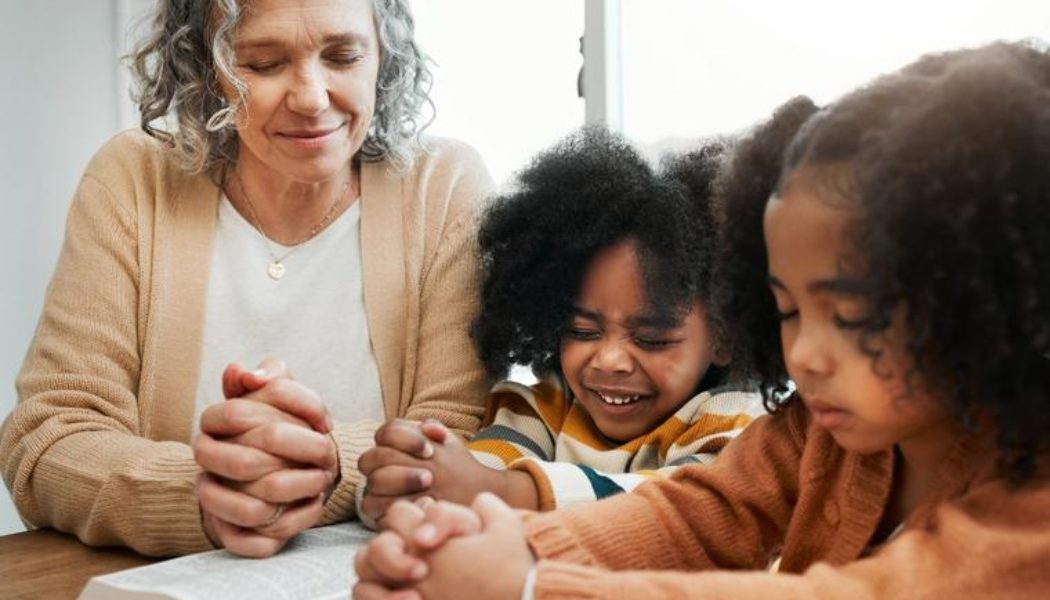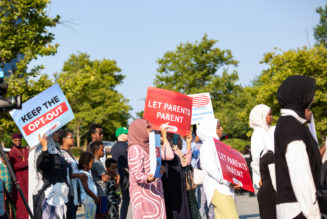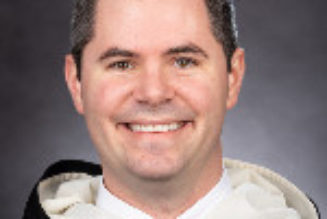
When Pope Francis was giving his aerial press conference returning from World Youth Day in Lisbon, he said the main issue in caring for the young is “accompaniment,” but “the problem is to know how to do this.” He described what he thinks is the most important part of that know-how: the “dialogue between old and young, between grandparents and grandchildren. This dialogue is important,” he emphasized, “more important than dialogue between parents and children.”
Describing anything as more important than the relationship between parents and children can’t help but startle. Pope Francis had made a similar point during his addresses to the young in Lisbon, calling grandparents “rays of light in our lives,” “roots of our joy” and teachers about life who train us “in how to journey onwards.” The whole theme of World Youth Day in Lisbon was ultimately tied to this intergenerational dialogue between old and new, in the relationship between the youthful Mary and her elderly cousin Elizabeth at the Visitation.
Those who have followed Pope Francis’ pontificate closely, however, rather than being surprised by his focus on grandparents at a meeting with 1.5 million youth, should have been expecting it. Throughout his decade as the successor of St. Peter, Pope Francis has vastly expanded the papal magisterium on the importance of grandparents. In 2021, he instituted on the fourth Sunday of July the World Day of Grandparents and the Elderly, penning a theological message each year for its celebration. In 2022, he gave an 18-part Wednesday general audience catechesis on “the meaning and value of old age.” He has repeatedly described our approach to and care for grandparents and the elderly as one of the most urgent issues facing the human family.
Part of his focus on the importance of grandparents and the elderly is autobiographical.
“I was lucky to know my four grandparents,” he said once in an interview. “The wisdom of the elderly has helped me greatly; that is why I venerate them.” This was especially so with his paternal grandmother, Rosa Margarita Vasallo di Bergoglio, whom he calls the most important figure in his life and the person he “loves most.” She babysat him for most of his first five years of life. He called her his “hearth” and “moral, religious and cultural repository.” She taught him about the saints and the Rosary, she took him to Mass, she taught him Italian and how to love Italian literature, and she gave him his identity as an Argentine of Italian ancestry. He keeps to this day in his breviary a letter — her “Creed” — that she prepared for him in anticipation of his priestly ordination. At the end of her life, he kept vigil at her bedside, holding her hand as she longed for Jesus’ coming.
The main part of his teaching on the importance of grandparents and the elderly, however, is theological. While St. John Paul II wrote a beautiful “Letter to the Elderly” in 1999, Pope Francis has given us the most articulated “papal pappoulogy” (from pappous, the Greek word for “grandparent”) in Church history.
We can focus on seven of his major insights.
The first is that “old age is a gift for all stages of life.” It’s a living endowment of maturity, wisdom, authority, holiness and loving service for children, grandchildren and the whole community. In sacred Scripture, long life is seen as divine blessing, seen in the lifespan of Noah, Abraham and Moses.
There is a temptation today, cautions the Pope, to treat old age as a disease, a time of decay and disability. In a throwaway culture, many try to “delete” and shun the elderly as useless, unproductive burdens, pretending that youth alone embodies the human ideal. That’s a denial of the past and a “betrayal of our humanity,” he says. Instead, we need to “honor our father and mother,” which he says means honoring the dignity of our grandparents, welcoming them, helping them, loving them and making use of their gifts.
Second, he says that the elderly are civilization’s great teachers, living encyclopedias who cultivate memory, show how we fit into a much larger history, and help us learn how to be human. They unite a wisdom of head and heart. They reveal that what matters is ultimately not physical strength and vigor, but the wisdom that comes from God and from time. When Pope Francis used to refer to Pope Benedict XVI as a “grandfather” for God’s family, he was paying him a supreme compliment, highlighting his counsel as a treasure for him and the Church.
Third, we need to get ready for old age. Old age is easily misunderstood. Pope Francis says that few prepare adequately for it beyond health care plans and retirement accounts.
“Being old,” however, “is just as important and as beautiful as being young,” and one needs a “plan” to live this stage to the full. That plan should include the sharpening of the senses and the sensitization of the soul, especially the virtues of compassion, pity, fidelity, devotion, and responsibility for oneself and others.
Francis urges seniors to take care of themselves physically and spiritually and to cultivate their interior life through daily prayer, the word of God and the Mass. He summons them to become “artisans of a revolution of tenderness” and infuse life with greater love. “Old age,” he encourages, “is no time to give up and lower the sails, but a season of enduring fruitfulness: A new mission awaits us and bids us to look to the future.”
Fourth, grandparents are called to be guardians of “tradition” and the transmission of the faith. The vocation of the elderly, he says, is to “bear witness of humanity and faith.”
Far more than leaving future generations “goods” in a will, he encourages them rather to leave a legacy of “goodness.” He laments that catechesis is often dry and urges grandparents to communicate the faith as a “lived tradition” that communicates the art of living. “Christian faith,” he notes, “is not just saying the Creed: It is thinking the Creed; it is understanding the Creed; it is doing the Creed.” He praises the nonagenarian Eleazar (2 Maccabees 6:18-31) as someone who transmits a coherent legacy of the relationship between faith and life and urges every senior to similar witness.
Fifth, to protect this transmission of wisdom, grandparents must become prophets against the corruption that afflicts each age. With prudence rather than screeds, they need to “sound the alarm” against relativism and help people see the dangers flowing from ideology of utilitarianism, the obsession of pleasure, and the pursuit of a life not based on truth, beauty, justice and sacrifice.
Like Noah, the elderly must build an ark and “save the world.” To do this, however, Pope Francis says they need to make sure that they themselves do not become corrupt with age, like the old men who lusted and sought to condemn unjustly Susanna (Daniel 13:1-64).
Sixth, he urges grandparents to form a “covenant” with the young.
“The future of the world depends on this covenant between young and old,” he underlines. If this dialogue of words and existence does not take place, he says, society will become sterile and lonely. “The elderly are like the roots of a tree” from which all generations, especially the young, must draw sap in order to flourish. That’s because “the covenant between the two poles of the generations of life (children and the elderly) also helps the other two generations (young people and adults) to bond with each other so as to make everyone’s existence richer in humanity.” Grandparents illumine the “whole span of human life” by showing the unity of all stages of life.
Finally, he says that grandparents and the elderly demonstrate the fullness and meaning of life paradoxically by teaching us how to prepare for death. They show that life on earth is not a nostalgia for the past but a “time of initiation,” a “novitiate,” a period of “promise” and “eager expectation” that the “best is yet to come.” They teach us the meaning of time by means of the horizon of eternity, that death is a birth into a new life, “superior to the time of mortal life,” in that place where Jesus has gone to prepare.
Pope Francis often reminds his fellow seniors that after he had submitted his retirement as archbishop of Buenos Aires, he was elected to take on the responsibilities of the papacy. Since that election, he has tried not only to preach this “papal pappoulogy” but to exemplify it.
World Youth Days are an opportunity for him to show the importance of this covenantal “dialogue between old and young, between grandparents and grandchildren” and to help both young and not-so-young people to enter into a conversation essential for their happiness, the future of the Church and the flourishing of all humanity.








